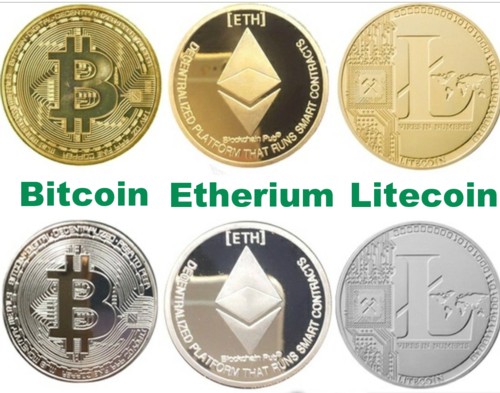Crypterium
The Bitcoin and Ethereum wave continued its record-breaking surge for the better part of 2017, creating huge euphoria in financial markets. But as the year approached its end, the size of the wave diminished substantially and now it looks like a runaway market as Bitcoin is under pressure and struggles to climb. Meanwhile Ethereum, (not Etherium) the second biggest cryptocurrency by market capitalisation has benefitted by this Bitcoin price drop, and consequently climbed to a new record-high of around $880 on Tuesday 2nd January. However that record may now be under threat because there is currently a fierce battle playing out in the crypto arena between Ethereum and Ripple. Ripple's capitalisation is now standing at $91 billion, whereas Ethereum's is still around $85 billion. Having said that, predicticions and expectations for Bitcoin, is that it will surpass the $40 000 mark by the end of 2018.
Bitcoin was the first decentralized digital currency, initially established as a worldwide payment system / cryptocurrency peer-to-peer network running on open-source software, without any need of an intermediary or central bank. This is because all bitcoin transactions are directly completed between parties, verified and validated by network nodes then recorded in a publicly distributed ledger known as a blockchain. Crytocurrencies in general follow this model, though each may have unique differences, like algorithms, hard forks, cross forks, authentication, protocols, security and new additional features.
By default subsequent cryptocurrencies shares a transaction history with Bitcoin up to a certain time and date. For example Bitcoin Cash is a hard fork of Bitcoin which occurred on August 1st 2017 in block 478558. Ethereum on the other hand is a cross fork of Bitcoin which occurred on the same date in block 478558 but uses the scrypt algorithm. Likewise Bitcoin classic, Bitcoin Gold, Bitcoin Lite, etc are all forks of Bitcoin with Peercoin (PPC), Unobtanium (UNO), Bytecoin (BTE), etc, using SHA-256 algorithm native to Bitcoin.
Be that as it may, the next Cryptocurrency wave is about to start and Crypterium is destined to sit at its crest. Crypterium is being flaunted as "the-next-big-thing". Currently the Crypterium ICO (Initial Coin Offering) have amassed in excess of $36 million and climbing, and due to close within the next 10 days. Crypterium is flaunted as the most capable and convenient payment processing solution useing the most efficient technology developed to date. It focuses on future technologies and network infrastructure, using contactless payment technologies guaranteeing the lowest exchange rate and immediate exchanges, using CrypteriumSX technology. Crypterium is also the only cryptocurrencies that will generate standard interest profit much like a banking system in the blockchain based world.
Crypterium seems to be a revolutionary, newer, better and an easier cryptocurrency to use than both Bitcoin and Ethereum. It currently costs a little less than Ripple and a viable currency to buy into, but read the Crypterium whitepaper before you do so.
DISCLAIMER:
NB! The author holds and invests in crypto assets. However, the contents of this post should not be misconstrued as investment advice; it's merely shedding much needed light on some lesser known cryptocurrencies that have the potential to grow far beyond that of Bitcoin.
The Bitcoin and Ethereum wave continued its record-breaking surge for the better part of 2017, creating huge euphoria in financial markets. But as the year approached its end, the size of the wave diminished substantially and now it looks like a runaway market as Bitcoin is under pressure and struggles to climb. Meanwhile Ethereum, (not Etherium) the second biggest cryptocurrency by market capitalisation has benefitted by this Bitcoin price drop, and consequently climbed to a new record-high of around $880 on Tuesday 2nd January. However that record may now be under threat because there is currently a fierce battle playing out in the crypto arena between Ethereum and Ripple. Ripple's capitalisation is now standing at $91 billion, whereas Ethereum's is still around $85 billion. Having said that, predicticions and expectations for Bitcoin, is that it will surpass the $40 000 mark by the end of 2018.
 |
| Ethereum at it new record high. |
By default subsequent cryptocurrencies shares a transaction history with Bitcoin up to a certain time and date. For example Bitcoin Cash is a hard fork of Bitcoin which occurred on August 1st 2017 in block 478558. Ethereum on the other hand is a cross fork of Bitcoin which occurred on the same date in block 478558 but uses the scrypt algorithm. Likewise Bitcoin classic, Bitcoin Gold, Bitcoin Lite, etc are all forks of Bitcoin with Peercoin (PPC), Unobtanium (UNO), Bytecoin (BTE), etc, using SHA-256 algorithm native to Bitcoin.
Be that as it may, the next Cryptocurrency wave is about to start and Crypterium is destined to sit at its crest. Crypterium is being flaunted as "the-next-big-thing". Currently the Crypterium ICO (Initial Coin Offering) have amassed in excess of $36 million and climbing, and due to close within the next 10 days. Crypterium is flaunted as the most capable and convenient payment processing solution useing the most efficient technology developed to date. It focuses on future technologies and network infrastructure, using contactless payment technologies guaranteeing the lowest exchange rate and immediate exchanges, using CrypteriumSX technology. Crypterium is also the only cryptocurrencies that will generate standard interest profit much like a banking system in the blockchain based world.
Crypterium seems to be a revolutionary, newer, better and an easier cryptocurrency to use than both Bitcoin and Ethereum. It currently costs a little less than Ripple and a viable currency to buy into, but read the Crypterium whitepaper before you do so.
DISCLAIMER:
NB! The author holds and invests in crypto assets. However, the contents of this post should not be misconstrued as investment advice; it's merely shedding much needed light on some lesser known cryptocurrencies that have the potential to grow far beyond that of Bitcoin.















